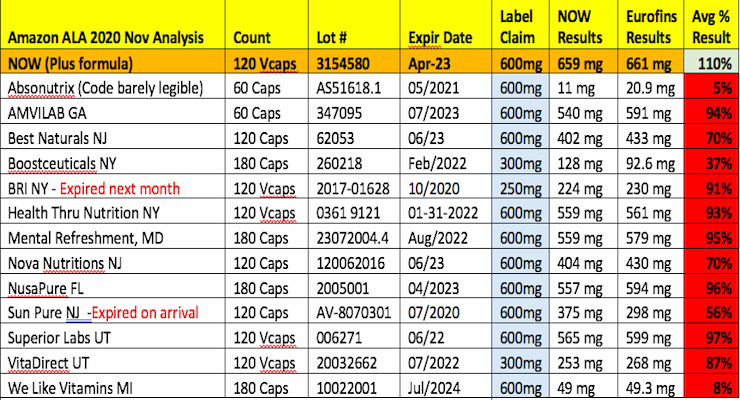Market Updates
NOW Test of ALA Products Reveals Significant Potency Problems
With some products testing at below 75% label claims, the company is once again raising concerns about supplements available through Amazon.

By: Mike Montemarano

Supplement company NOW announced its fifth round of testing products whose main sales appear to be on Amazon since it began earlier this year, with a new report detailing some troublesome findings on alpha lipoic acid (ALA) supplements. Previously, the company found quality and potency issues with several CoQ10, SAMe, Acetyl-l-Carnitine, and Phosphatidyl Serine products it purchased through the Amazon marketplace and tested.
In October, the company purchased two samples of each ALA product it tested on Amazon, and through its internal testing facility, conducted High Performance Liquid Chromatography (HPLC) using a test method known as RP-HPLC with UV detection. They also sent the same lot of each product to Eurofins, an independent quality testing lab, to test by the same method. NOW’s ALA product tested at 110% potency, while the other 13 brands it tested combined to average 69% of label claim.
“Six out of these 13 brands were under 75% potency, and all of these products listed were legally unacceptable as cGMPs (current Good Manufacturing Practices) require minimum 100% potency tested at label claims,” Dan Richard, vice president of Global Sales and Marketing at NOW, said. “The results were actually better than expected compared to prior reports, where average potencies were often below 50% of label claims, but given that many consumers rely on Amazon for dietary supplement purchases, the finding of significant quality concerns in every category we have tested raises profound concerns.”
While some products were only a few percentage points short of meeting the potency claimed on the label, some products tested within the single digits – Absonutrix ALA supplements, for example, tested at 5% ALA content compared to what was claimed on the label, according to the average results of NOW and Eurofins’ testing, while a product made by We Like Vitamins had 8% of the ALA it claimed. One product, ALA capsules made by Sun Pure, were expired upon arrival, NOW reports.
Here is the full list of products and the potencies at which they tested, averaged out between NOW’s and Eurofins’ test results: Absonutrix, 5%; Amvilab, 94%; Best Naturals, 70%; Boostceuticals, 37%; BRI (arrived one month away from expiration), 91%; Health Thru Nutrition, 93%; Mental Refreshment, 95%; Nova Nutritions, 70%; NusaPure, 96%; Sun Pure (expired on arrival), 56%; Superior Labs, 97%; VitaDirect, 87%; We Like Vitamins, 8%.
NOW reports that, while it is not standard practice, the company always adds significant overages in order to ensure that all of its products exceed label claims through the listed “best by” date. For ALA, NOW adds a minimum 5% overage to always test over 100% of label claim. The company also conducts in-house testing on its ALA products for heavy metals, microbials, and other impurities.


